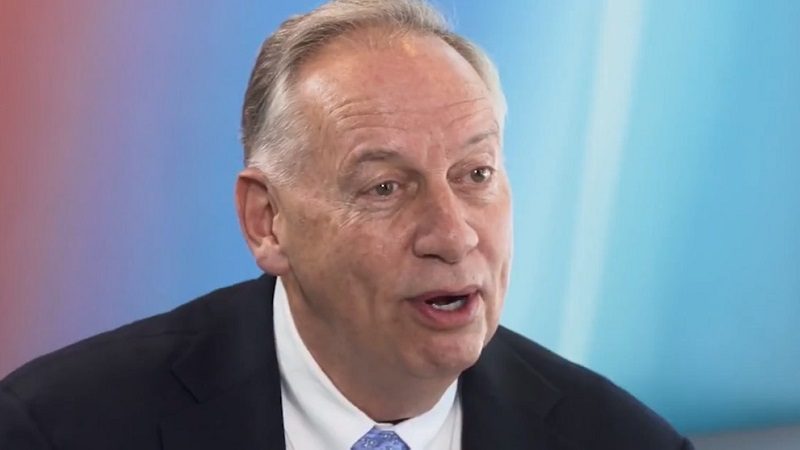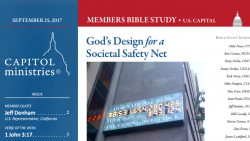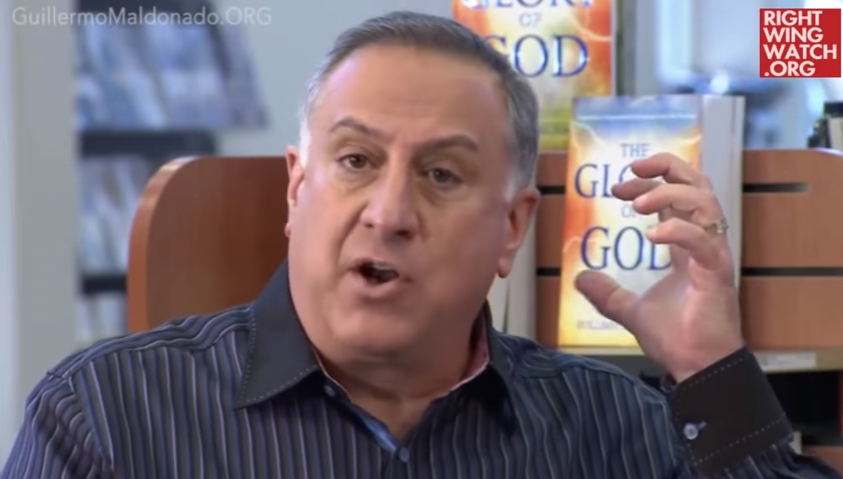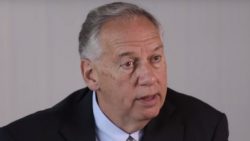Ralph Drollinger, the man who leads Bible studies for members of President Trump’s Cabinet and members of Congress, is claiming that The New York Times has libeled him, contending that a January 6 op-ed wrongly portrayed him as a “Christian nationalist.” Drollinger’s organization, Capitol Ministries, has posted online his January 17 letter to the Times’ executive editor, Dean Baquet, demanding a retraction and space in the paper to make his case.
Katherine Stewart’s commentary called the new Museum of the Bible a “safe space for Christian nationalists” and discussed a training session Capitol Ministries held there in November. Capitol Ministries quickly labeled the column “fake news” and published a post saying that Drollinger disavows the terms “Christian nationalist” and “dominionist.” Unlike some Religious Right activists, Capitol Ministries said, Drollinger does believe in separation of church and state and does not believe the U.S. was founded as a Christian nation and therefore does not believe it needs to be restored as a Christian nation.
Well. Let’s talk about some terms, and let’s look at Drollinger’s own writings.
Drollinger’s letter to The New York Times equates the terms Christian nationalism, dominionism, Christian Reconstructionism and theocracy, and says it is “character assassination” to accuse him of “embracing a philosophy that promotes a Church-controlled government.” According to Capitol Ministries, “Drollinger does not believe in Christian-run nations because that concept is not Biblical.”
Really? The assertion that Drollinger “does not believe in Christian-run nations” is a remarkable one coming from a ministry whose purpose is to convert public officials around the globe to Drollinger’s “very conservative” brand of Christianity, with the apparent belief that having “righteous” Christians as lawmakers and judges will lead to policies that reflect his particular biblical worldview, and thus bless the nation.
Drollinger may not believe that the Church should be running the country—he says he believes in institutional but not influential separation of church and state—but he clearly wants his kind of “righteous” Christians in positions of power. Once there, he says, they should not “compromise biblical absolutes in [their] policies or interactions with others.”
And while Drollinger has claimed that he doesn’t tell public officials how to vote on specific pieces of legislation, he sure seems to expect certain things of them. “I lead them up to water and make it pretty obvious which pool to drink from,” he told an interviewer last year.
In his first written Bible study of 2018—he produces them weekly for public officials—he says, “Governments and their leaders must send a constant message that sin will be punished.” In another study he said that the Bible not only permits but requires the death penalty in some situations, writing, “as a lawmaker it is incumbent on you to stand for the death penalty.”
In his January 23 study on the sinfulness of homosexuality, he concludes, “Legalizing same-sex ceremonies in any state is a very, very serious matter in the eyes of God … such ‘progressive thinking’ eventually evokes His wrath.” He tells public officials that not voting “pro-life” is “wrong according to the truths of scripture.” He says entitlement programs lack “any basis of biblical authority.”
Back to terminology. Simplifying, and without getting too far into the theological weeds, Christian nationalism, dominionism, Christian Reconstructionism and theocracy are related but not identical terms, and some of them are contested and used with a range of meanings. Theocracy refers to a government run by religious authorities, in which there’s no distinction between religious and civil law, which is deemed to have divine authority. Ancient Israel was a theocracy; so is the current government in Iran.
Christian Reconstructionism is an ideology that was promoted in the U.S. in the 20th century by R.J. Rushdoony and his followers; it calls for Christians to gain political power and impose their interpretation of Biblical law, including Old Testament punishments for infractions, on civil institutions. Few Religious Right leaders today would associate themselves with Reconstructionism, but some of its ideological constructs have been widely adopted among conservative evangelicals, including the idea that God, through the Bible, gives institutions like the family, church and government, authority or jurisdiction in specific areas. Drollinger and other Religious Right leaders draw on this idea to argue that care for the poor, for example, is a job meant for the family and church, not the government.
Dominionism refers to the belief that Christians are meant to have dominion over the government and other spheres of influence—or “mountains”—in society. Pentecostal leaders associated with the New Apostolic Reformation believe that a triumphant dominion-taking church will speed the second coming of Christ. While that end-times theology is not necessarily shared by many evangelical leaders, the language of Seven Mountains dominionism has been adopted as a sort of lingua franca for the Religious Right that encourages political engagement while bridging theological divides.
As for Christian nationalism, Capitol Ministries adopts a definition proposed by author Michelle Goldberg as positing “a Christian right to rule” and promoting revisionist history that separation of church and state “is a fraud perpetrated by God-hating conservatives.” Some Republican political operatives, like American Renewal’s David Lane, do explicitly embrace a Christian-nation history and long for a restoration of America as a Christian nation. I would argue that the term could also be applied more broadly to Religious Right leaders who argue that Christians are somehow more American than others, that the First Amendment’s religious liberty protections were meant only for Christians and do not apply in the same way to, for example, Muslims.
While acknowledging Drollinger’s protestations that none of these terms apply to him, let’s look some more at what he and his organization teach.
Drollinger recently called on public officials to “incentivize obedience to God,” saying that the government “cannot cause an individual to be obedient to God in his heart, but it can incentivize the institution God has ordained to accomplish that: the Church.” The head of the group’s Tennessee effort says his mission is “to encourage and equip Christian legislators to advance the Lordship of Christ in the political realm.”
Drollinger has written that once “righteous” people hold positions of authority in government, they are obligated to hire only other “righteous” people. Capitol Ministries may dispute that he is effectively arguing for a religious test for public office, but I interpret Drollinger’s writings as a clear assertion that in the context of the public officials his ministry targets, “righteous” means Christian—and not just any Christian, but one who is both theologically and politically conservative.
“It is only through righteous lawmakers and law enforcers that a society can have any semblance of justice,” Drollinger wrote in a Bible study published in July 2017. “Justice stems from righteous, God-fearing individuals who are grown into such by the discipleship priorities of the Church in a composite nation of co-abiding Institutions of Church and State.”
So why does all this matter? Drollinger certainly has the right enjoyed by every American to teach and preach his interpretation of the Bible. That, of course, does not prevent other Americans from exercising their right to vigorously disagree with his beliefs about the Bible, the Constitution, the role of women in church and society, or any of the other areas he writes about. Given that Drollinger’s ministry is focused on the conversion of public officials to his worldview, and given the privileged access he is given to high-level officials like members of Trump’s Cabinet, his activities are worthy of critical public attention.
As we have noted, Drollinger teaches that there is, “in terms of serving the Institution of the State, the absolutely critical preeminent duty of the Church in an institutionally separated society: to convert the soul and disciple—Christianize—the leaders of the State and its citizenry.”
Drollinger insists he is not a Christian nationalist. Others may draw a different conclusion from reading his writings, which we have linked to extensively and which Capitol Ministries, to their credit, makes freely available online.









